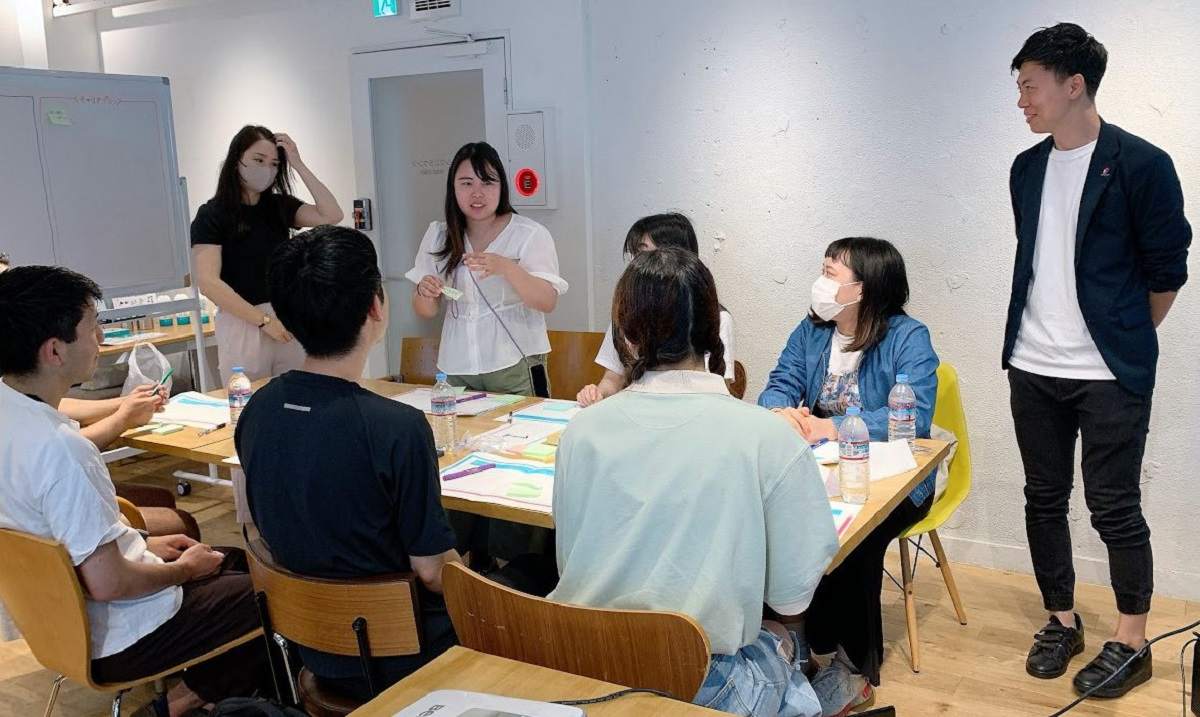
Young people discuss their life plans at a workshop in Shibuya Ward, Tokyo, on June 18.
11:56 JST, October 23, 2023
Medical institutions and local governments are increasingly promoting preconception care to encourage people who may one day experience pregnancy and childbirth to safeguard their health.
Following in the footsteps of the United States and the World Health Organization, Japan’s efforts are aimed at not only raising health awareness from a young age to enable trouble-free childbirth, but also at helping people maintain a healthy life as they age.
The situation surrounding pregnancy and childbirth varies from country to country. In Japan, the number of underweight women who are believed to have a higher possibility of delivering a baby weighing less than 2,500 grams has generally been increasing among the younger generation. The average age at which a woman gives birth to her first child has been over 30 in recent years, and one in 11 babies were conceived through in vitro fertilization based on the latest data released in August.
In light of these circumstances, medical experts are calling for people to receive counseling and medical checkups, and if they want a baby, to think about a life plan that considers the timing of pregnancy and childbirth.
“We’re planning to leave Japan due to an overseas work assignment. Is it all right to delay preparations for having a child?” “We’re wondering if we should start fertility treatment now.” The Preconception Care Center at the National Center for Child Health and Development in Setagaya Ward, Tokyo, often hears such questions and concerns, mainly from couples in their 20s and 30s.
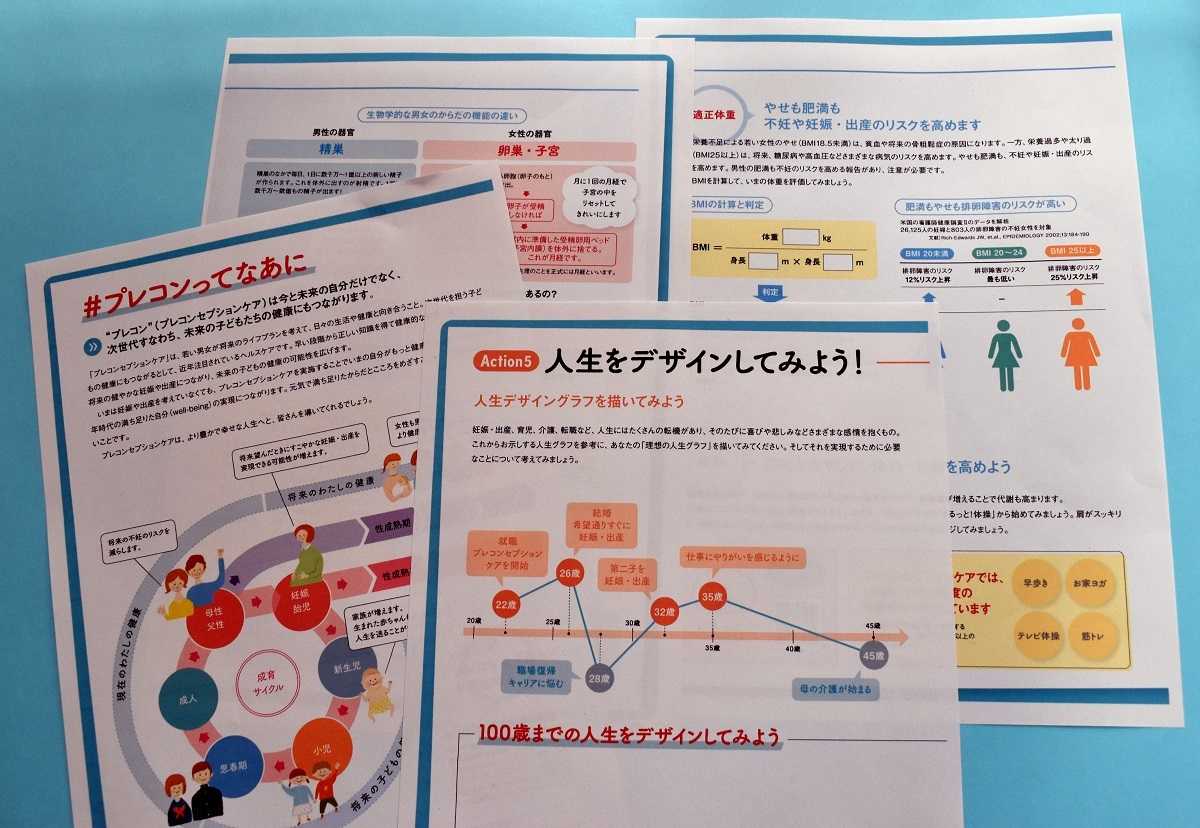
Preconception notes edited by the Preconception Care Center at the National Center for Child Health and Development provide information about health and making a life plan. The materials can be downloaded from the center’s website.
The Preconception Care Center was opened in 2015 as the first facility of its kind in Japan. It provides medical checkups in areas such as sexually transmitted diseases and thyroid function, and nutritional checks including for folic acid and iron.
Counseling sessions are available both in person and online.
In recent years, the number of medical institutions offering preconception outpatient services has increased nationwide. For the past four years, the Kasama city government in Ibaraki Prefecture has subsidized a portion of the cost of outpatient treatment for preconception care.
The U.S. Centers for Disease Control and Prevention as well as the WHO began advocating preconception care before Japan, focusing on improving perinatal and maternal mortality rates.
A key issue in Japan is underweight among young women. According to a Health, Labor and Welfare Ministry survey, women with a BMI of less than 18.5 account for about 20% of women in their 20s. Japan has a higher percentage of such underweight women and low-birth-weight babies compared to other major industrialized countries.
“If a woman’s BMI drops below 18.5, she has a higher possibility of developing osteoporosis when she gets older,” said Dr. Naoko Arata, who founded the preconception center together with Dr. Asako Mito at the Setagaya hospital and is in charge of the facility’s operations.
In August, Arata and Mito held a special class on mental and physical health for first- to third-grade elementary school students and their parents in the ward. The doctors asked the children to draw a picture of a baby in a mother’s body based on their imagination, and explained in words so that the children could understand how life is created.
They also explained why body parts that are covered by a bathing suit are important and should be protected from ill-intentioned touching by others.
“These parts are related to having a baby. When you grow up, you’ll be able to have babies,” Mito said.
Mito said, “Children will understand the importance of these body parts through such explanations.”
When children learn about such matters at a young age, it’s easier for them to acquire a sound knowledge of the body.
Arata and Mito also get asked basic questions by adults, such as “I want to have a baby, but I don’t know when to have sex.”
Arata voiced her concern, saying: “Whether to have children, or the number of children to have, is each person’s decision. However, I get the impression that basic knowledge like this, which people should have before making such a decision, is greatly lacking in Japan.”
Sharing experiences
People in their teens or 20s often have difficulty envisioning their future life. If they want to have a baby, however, it’s important to make plans that factor in pregnancy and childbirth.
A workshop was held in Shibuya Ward, Tokyo, in June to encourage young people to think about their life and career. Fine, a Japanese nonprofit organization that supports people undergoing fertility treatment, organized the event together with Ninkatsu Style, a brand for fertility-related items, and Ferring Pharmaceuticals.
Kazuya Kifune of Fine served as a moderator. Kifune spoke about his own experience of becoming a father at the age of 34 after undergoing fertility treatment, and the participants in their 20s listened with great interest.
Asked about their future, one attendee said, “I want to live overseas,” while another said, “I want to have two children.”
In the next session, they were asked to envision a woman in her 30s. The woman’s situation included her getting married at 30 without talking to her partner about having a child by 39 and not getting pregnant amid less communication with her husband due to stress and her anxiety for the future.
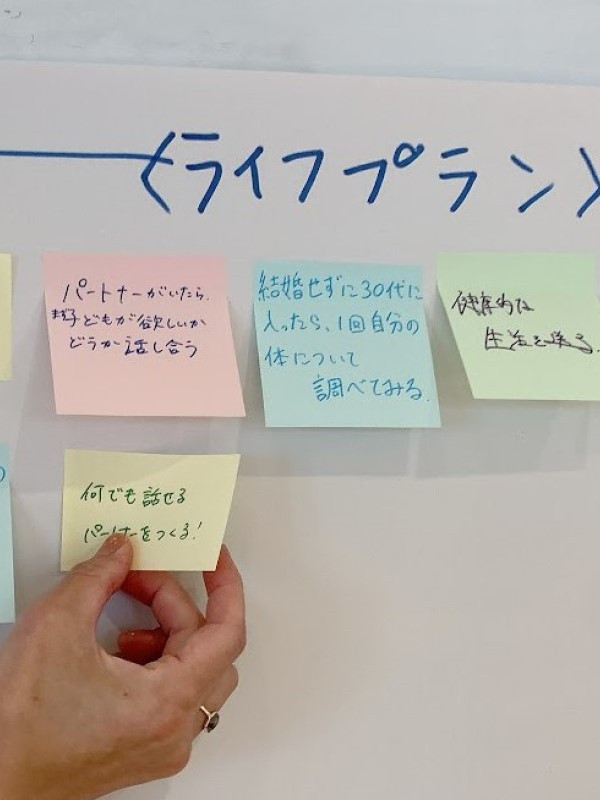
Workshop participants’ future goals are displayed on a board.
Participants responded with dismay, saying things like “It’ll be hard to balance work and my private life.” Someone said, “If I don’t have a child, I’ll think about life with just the two of us or adopting a child.”
Based on these discussions, they were asked by Kifune to think about their life plan.
A person called Daiki at the workshop said, “I want to learn about the maternity and childcare leave system at my workplace as soon as possible.” The 24-year-old office worker from Chiba Prefecture said, “I thought it would be easy to have children, but it was good to learn about many things, including fertility-related issues.”
A woman who used the name Yui at the event said: “I’m job-hunting now. I want to know if my life plan is feasible, based on the benefits companies offer.” The 21-year-old college junior said, “I want to find a future partner who I can talk to about anything.”
Women involved in running the event shared their experiences.
“If you have a cesarean section, you have to wait for a while for the next delivery. I didn’t know that,” one said. Another said, “Pregnancy and childbirth may temporarily halt your career, but it’ll give something good for your life.”
The young participants listened intently to the opinions of older generations.
According to the Japan Society for Reproductive Medicine, the best age for a woman to become pregnant and give birth is in her 20s, taking into account her physical development and the risk of ailments. It is desirable to give birth to a first child by one’s mid-30s at the latest.
Based on the suggested age, individual planning is important, considering various factors such as if a woman goes to school or works as well as her marital status.
Since fiscal 2022, fertility treatment has been covered by public insurance in Japan. However, the number of treatments covered by insurance decreases with age, and women 43 and older are not covered.
However, women often pass the age at which they can easily conceive, amid a busy life, work and other activities. The older they get, the lower the chance of becoming pregnant and the higher the danger of a miscarriage.
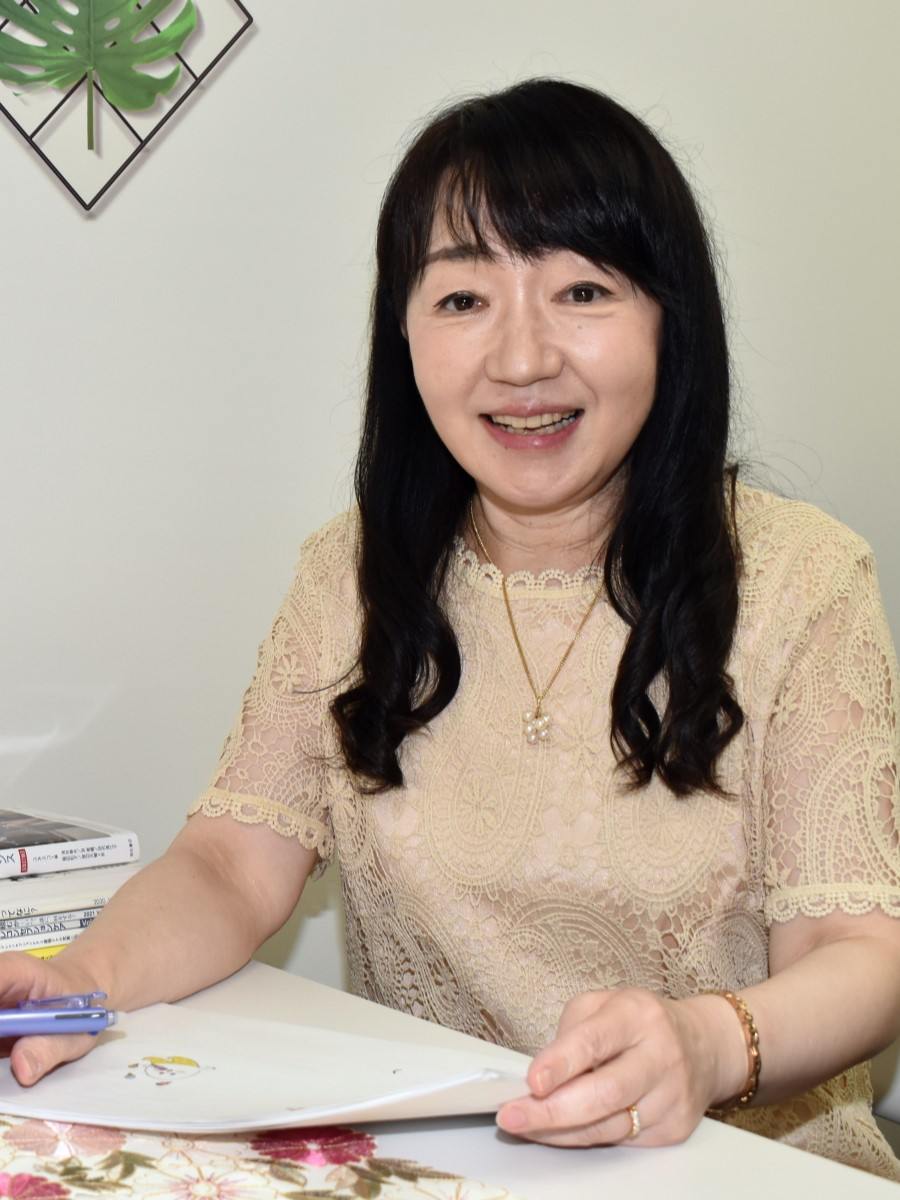
Musashino University Prof. Akiko Sakajo speaks during an interview with The Japan News.
Akiko Sakajo, a professor at Musashino University, teaches at several universities about the importance of preconception care. She emphasizes that pregnancy and childbirth are the individual decision of each couple or individual, and teaches people about the mechanism of pregnancy and how to prepare for it.
Sakajo said, “I want to prevent women from having to give up on their desire to have children due to age or other factors.”
She cannot forget the words of a desperate woman undergoing fertility treatment: “I didn’t know it would be difficult to have kids when I was older. I wish someone had told me that earlier.” These words inspired Sakajo to teach people about the importance of preconception care.
“When talking about preconception care, the focus tends to be on care before pregnancy. However, such care is important for the health management for all people,” Sakajo said. “I hope young people will have the knowledge they need to increase their options for their future life.”
Learning late
People who have children later in life can realize the importance of thinking about pregnancy and childbirth from a younger age.
Maiko Okada, 53, from Saitama Prefecture, had her first child at the age of 42. She continued fertility treatment and had a second child at 45. She is busy taking care of two energetic elementary school children, while working as a peer counselor at Fine and in a separate part-time job.
“When you give birth at an older age, you wonder how long you’ll live and how old your child will be when you die,” said Okada. “People tend to think that older women are mentally mature. But in terms of raising children, they’re the same as young women. Many of us spent so long as [childless] adults, that it’s sometimes hard for us when our usual pace is disrupted.
“People who want to have a child should be aware of preconception care from a younger age,” she said.
As a mother who delivered her first child at 48 through fertility treatment, I agree with Okada. I started treatment at 43, having gotten married at an older age.
My struggles to get pregnant included a miscarriage. Now as a 53-year-old mother, I’m filled with gratitude for being miraculously blessed with a child at such an advanced age. My husband and I are happy to see our talkative 4-year-old girl dance to animation songs.
However, in addition to my full-time work, I have to raise my child and do housework. My husband does such tasks, too, but there is almost no time to relax. We’re also likely to have financial concerns, as my daughter will incur educational costs after we reach retirement age.
Furthermore, my fertility treatment and postpartum period coincided with caring for my mother, which was also tough. I didn’t pay attention to pregnancy and childbirth in my 20s, as I was caught up in my work as a journalist. I thought I’d have the chance to have children someday. My 40s had included a long tough time, especially mentally.
Changing priorities
Last year, the number of children born in Japan reached a record low of 770,000, dropping below 800,000 for the first time. According to a survey conducted in 2022 on about 2,000 parents with babies and infants by Tamahiyo, Benesse Corp.’s media service covering for maternity and childbirth, 76% of mothers felt it was difficult to give birth and raise children in Japan, 10 percentage points higher than the previous year; 50% of fathers also felt this way.
“Today, people tend to prioritize efficiency. Child-rearing, however, is the total opposite of that,” said Akiko Boda, an expert in postpartum care.
“Many young people worry that they won’t have time for themselves or that they’ll have to change their lifestyle. I think this may influence young people’s perceptions, as they watch older people with children facing difficulties both working and finding nursery schools for kids,” she said. “Another factor may be that young people are not familiar with babies and small children, as there are few around them.”
This summer, my family attended an event for parents and children. There was a baby at the venue, not yet a year old. My 4-year-old daughter was curious about the baby and talked to him.
After coming back home, she closed the fusuma sliding doors, saying, “I’m going to deliver a baby now.”
In a few minutes, she opened the doors and said, with her favorite stuffed animal wrapped in a towel in her arms, “A baby is born!”
I want to help my daughter maintain this happy image of having a baby. Her future preconception care may be a big part of this someday.
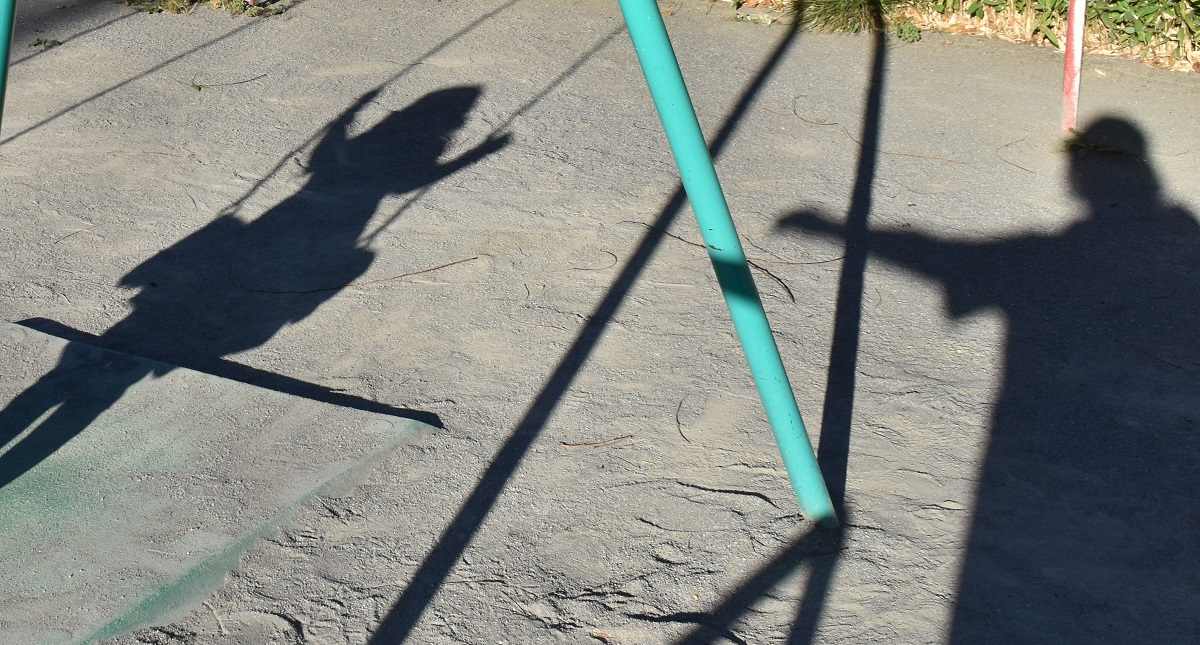
The writer and her daughter play in a park in Tokyo.
Top Articles in JN Specialities
-

Tokyo University of the Arts Now Offering Free Guided Tour of New Storage Building, Completed in 2024
-

Exhibition Shows Keene’s Interactions with Showa-Era Writers in Tokyo, Features Newspaper Columns, Related Materials
-

The Japan News / Weekly Edition (1/30-2/5)
-

Step Back in Time at Historical Estate Renovated into a Commercial Complex in Tokyo
-
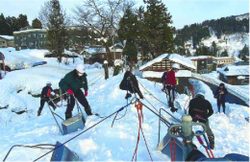
Prevent Accidents When Removing Snow from Roofs; Always Use Proper Gear and Follow Safety Precautions
JN ACCESS RANKING
-

Japan PM Takaichi’s Cabinet Resigns en Masse
-

Japan Institute to Use Domestic Commercial Optical Lattice Clock to Set Japan Standard Time
-

Israeli Ambassador to Japan Speaks about Japan’s Role in the Reconstruction of Gaza
-

Man Infected with Measles Reportedly Dined at Restaurant in Tokyo Station
-

Videos Plagiarized, Reposted with False Subtitles Claiming ‘Ryukyu Belongs to China’; Anti-China False Information Also Posted in Japan




















